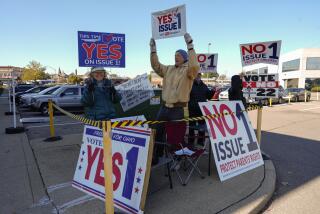West Virginia Tobacco Suit Approaches Trial
- Share via
A landmark lawsuit in West Virginia aimed at forcing the tobacco industry to provide free annual medical tests for healthy smokers is a potential minefield for the dozens of witnesses expected to testify.
Jury selection begins Wednesday in the class-action lawsuit, which has been carefully structured with restrictions on what can and cannot be said to preserve its status as a class action.
The lawsuit, against four of the nation’s biggest tobacco companies, covers about 250,000 West Virginians who have smoked the equivalent of a pack a day for five years but who are not yet sick.
It is the first lawsuit of its kind to go to trial in the United States, essentially a product liability case with medical monitoring as the proposed remedy for wronged consumers.
Lawyers and witnesses must focus only on issues that are common to any smoker, avoiding those that are unique to any particular smoker. The case must focus on the conduct of the tobacco companies, the judge said.
The first attempt to try the case ended with a mistrial in January after a witness made an apparently inadvertent reference to addiction. That was one of the words banned from testimony because the tobacco companies argued it raised issues of individual behavior and reasons for smoking, compromising the cohesion of the class.
Opening statements are set for Sept. 10, with six jurors and four alternates expected to sit through testimony into December. The plaintiffs are R.J. Reynolds, Philip Morris, Brown & Williamson and Lorillard.
A class-action medical monitoring case also is in the courts in Louisiana, but it differs from West Virginia’s in several ways. For one thing, the Louisiana case also asks the tobacco companies to help smokers quit.
July selection for the Louisiana trial took two months this summer. Testimony was tentatively set to begin this Wednesday, but it might be delayed by a pending appeal on the jury selection method. A gag order prevents lawyers from discussing the case.
More to Read
Sign up for Essential California
The most important California stories and recommendations in your inbox every morning.
You may occasionally receive promotional content from the Los Angeles Times.













